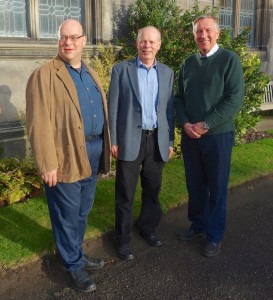These lectures will take place in Lower College Hall, North Street. The lectures will discuss the close relationship between how knowledge and problems may be represented and how people and computers use these representations to guide their reasoning about the problems.

Prof Steve Linton, Prof Alan Bundy and Prof Ian Sommerville
Distinguished lectures, 27th November 2013
10.00 1. Title: The Interaction of Representation and Reasoning
Abstract: Successful reasoning is dependent on appropriate representation of both knowledge and of successful methods of reasoning. A change of representation can change an intractable problem into an easy one. Failures of reasoning can suggest changes of representation. Reasoning failures can, for instance, take the form of proofs of false conjectures, failures to prove true conjectures or inefficient inference. I will illustrate these interactions by drawing on work in my research group.
11.30 2. Title: Theory Evolution in Physics
Abstract: We investigate the problem of automatically repairing a faulty Physics theory when it conflicts with experimental evidence. We introduce novel strategies for fault diagnosis and for representation repair. Diagnosis and repair are composed into general-purpose repair plans. We will illustrate this with two such plans, where theory and experiment conflict over (a) the value and (b) the dependence of a function, respectively. We represent both physical concepts and the repair plans using higher-order logic. This is because many physical concepts are most naturally represented as higher-order functions and because polymorphic higher-order functions are required to enable the repair plans to be applied to diverse situations.
14.00 3. Title: Reformation: A Domain-Independent Algorithm for Theory Repair
Abstract: We describe and invite discussion on work in progress on reformation, a new algorithm for the automated repair of faulty logical theories. A fault is revealed by a reasoning failure: either the proof of a false theorem or the failure to prove a true conjecture. Repair suggestions are systematically extracted via analysis of the attempted unification of two formulae. These suggestions will either block an unwanted but successful unification or unblock a wanted but failed unification attempt. In contrast to traditional belief revision and abduction mechanisms, the repairs are to the language of the theory as well as to the deletion or addition of axioms.
Professor Alan Bundy
Professor Alan Bundy is Professor of Automated Reasoning in the School of Informatics at the University of Edinburgh. Professor Bundy is a world-leader in the area of artificial intelligence called Mathematical Reasoning and has held more than 50 research grants in this area since the 1970s , has published more than 200 research papers and has been awarded the 2007 IJCAI Award for Research Excellence and Herbrand Award for Distinguished Contributions to Automated Deduction. He is a Fellow of the Royal Society, A Fellow of the Royal Society of Edinburgh, a Fellow of the Royal Academy of Engineers and, in 2012, was awarded a CBE for services to computing science. As well as his research work, Professor Bundy has played an active role in the British Computer Society and has been instrumental in supporting changes to the computer science curriculum in schools.
Slides:


